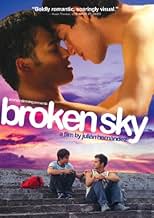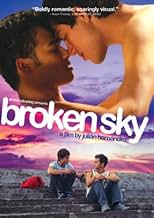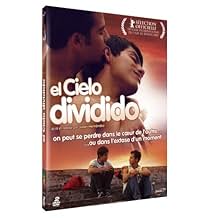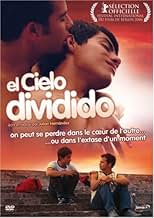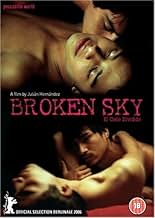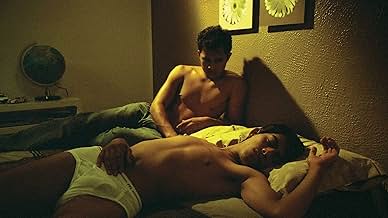CALIFICACIÓN DE IMDb
5.7/10
1.3 k
TU CALIFICACIÓN
Agrega una trama en tu idiomaTwo students, Gerardo and Jonas, are in love. However, Jonas becomes obsessed with another boy, which leads to Gerardo moving into arms of Sergio.Two students, Gerardo and Jonas, are in love. However, Jonas becomes obsessed with another boy, which leads to Gerardo moving into arms of Sergio.Two students, Gerardo and Jonas, are in love. However, Jonas becomes obsessed with another boy, which leads to Gerardo moving into arms of Sergio.
- Dirección
- Guionista
- Elenco
- Premios
- 2 premios ganados en total
Clarisa Rendón
- María
- (as Clarissa Rendón)
- Dirección
- Guionista
- Todo el elenco y el equipo
- Producción, taquilla y más en IMDbPro
Opiniones destacadas
This could have been the gay counterpart to Gone With The Wind given its epic lenght, but instead it satisfied itself by being a huge chain of empty episodes in which absolutely nothing occurs. The characters are uni-dimensional and have no other development in the story (there's actually no story either) than looking for each other and kissing. It's a shame that an interesting aesthetic proposition like having almost no dialog is completely wasted in a film than makes no effort in examining the psychology of its characters with some dignity, and achieving true emotional resonance. On top of that, it pretends to be an "art" film by using the worst naive clichés of the cinematic snobbery. But anyway, if someone can identify with its heavy banality, I guess that's fine.
Saw it at SIFF. This is a different kind of film -- but I loved it. I loved the fact that there wasn't a lot of dialogue. I appreciated the non-verbal aspects of this film. While the lack of dialogue some may find tedious it was nice to see something that wasn't shot for the small screen, something that made me pay attention visually, and something that made me think a bit. I thought the camera technique used to convey the passage of time was quite effective. The only technical aspect which drove me nuts was the use of white subtitles on a white background; fortunately this was a small, small part of the film but at key junctions in the story development. I'm rather fond of this film and would like to watch it again.
'El Cielo dividido' (BROKEN SKY) is a daring, experimental film from Mexican writer/director Julián Hernández and as such it is bound to polarize audiences. Some will fault the film for self-indulgence while others will praise the bravery of a film of this topic to come from a country not exactly known for its flexible social attitudes.
Julián Hernández focuses on the history of a first love and without using dialogue he tells his story simply with silent actors, minimal narrative comments which serve as program notes, music, and ravishingly beautiful photographic composition. Gerardo (Miguel Ángel Hoppe) opens the film, a solo youth wandering what appears to be the streets of Mexico City finally ending up in an open amphitheater where his eye glimpses another lone youth Jonas (Fernando Arroyo) sitting staring into space. Gerardo wanders over to him, sits beside him, gains the courage to touch his shoulder, Jonas responds glowingly - and love begins. Through the next scenes we find the couple making love both in bed and in unexpected public places including the stacks of the library of the school where they both are students -and where another pair of eyes enters: Sergio (Alejandro Rojo) watches longingly as Gerardo and Jonas kiss and display an aura of passion Sergio obviously longs for.
The new couple share many experiences, all bathed in love, until they eventually go to a disco: Jonas dances with an enchanted Bruno (Ignacio Pereda) and a trace of chemistry is generated, a fact that Gerardo, watching the boys dance, senses and is disturbed. A crack is created in their bliss and that crack only widens as they each have mixed responses to what they perceive is escaping. Gerardo encounters the winsome Sergio and the two bond physically, a fact that forces Jason to reevaluate his initial feelings for Gerardo.
All of this story is told without dialogue of words but with a very strong dialogue of eyes. Director Hernández seems to want to share how love is an internalized emotion, only demonstrated with physical intimacy, but fragile as a newborn in its vulnerability to wounds. Cinematographer Alejandro Cantú finds stunning settings and lighting and sensitive explorations of love making that never exceed tasteful states. His manner of showing time elapsing is to pan walls within a room that serve as flashbacks and flash-forwards as a means of carrying the story forward. Film editor Emiliano Arenales Osorio uses some very creative techniques to keep the viewer guessing as to whether we are observing fact, fantasy, present or past. And the musical score by Arturo Villela deftly maintains the minimalist stance with simple phrases by cello, harpsichord, and violin, saving the passion expression for the use of Dvorák in Rusalka's 'Song to the Moon' as ravishingly sung by Renée Fleming All of those praises being said, the major reason this film doesn't retain an audience base is its length: it is 140 minutes long, repetitive, and would have been much more powerful had it been cut to 90 minutes at best. It is far too visually stunning a piece of work to step beyond the patience of an audience happy to see the birth and blossoming and challenges of a first love between two beautiful young men. The actors are indeed a pleasure to watch, but in this case less is more. One wonders what Julián Hernández will create next. He deserves applause for this experimental film but hopefully will learn from its tendency toward self-indulgence. Grady Harp
Julián Hernández focuses on the history of a first love and without using dialogue he tells his story simply with silent actors, minimal narrative comments which serve as program notes, music, and ravishingly beautiful photographic composition. Gerardo (Miguel Ángel Hoppe) opens the film, a solo youth wandering what appears to be the streets of Mexico City finally ending up in an open amphitheater where his eye glimpses another lone youth Jonas (Fernando Arroyo) sitting staring into space. Gerardo wanders over to him, sits beside him, gains the courage to touch his shoulder, Jonas responds glowingly - and love begins. Through the next scenes we find the couple making love both in bed and in unexpected public places including the stacks of the library of the school where they both are students -and where another pair of eyes enters: Sergio (Alejandro Rojo) watches longingly as Gerardo and Jonas kiss and display an aura of passion Sergio obviously longs for.
The new couple share many experiences, all bathed in love, until they eventually go to a disco: Jonas dances with an enchanted Bruno (Ignacio Pereda) and a trace of chemistry is generated, a fact that Gerardo, watching the boys dance, senses and is disturbed. A crack is created in their bliss and that crack only widens as they each have mixed responses to what they perceive is escaping. Gerardo encounters the winsome Sergio and the two bond physically, a fact that forces Jason to reevaluate his initial feelings for Gerardo.
All of this story is told without dialogue of words but with a very strong dialogue of eyes. Director Hernández seems to want to share how love is an internalized emotion, only demonstrated with physical intimacy, but fragile as a newborn in its vulnerability to wounds. Cinematographer Alejandro Cantú finds stunning settings and lighting and sensitive explorations of love making that never exceed tasteful states. His manner of showing time elapsing is to pan walls within a room that serve as flashbacks and flash-forwards as a means of carrying the story forward. Film editor Emiliano Arenales Osorio uses some very creative techniques to keep the viewer guessing as to whether we are observing fact, fantasy, present or past. And the musical score by Arturo Villela deftly maintains the minimalist stance with simple phrases by cello, harpsichord, and violin, saving the passion expression for the use of Dvorák in Rusalka's 'Song to the Moon' as ravishingly sung by Renée Fleming All of those praises being said, the major reason this film doesn't retain an audience base is its length: it is 140 minutes long, repetitive, and would have been much more powerful had it been cut to 90 minutes at best. It is far too visually stunning a piece of work to step beyond the patience of an audience happy to see the birth and blossoming and challenges of a first love between two beautiful young men. The actors are indeed a pleasure to watch, but in this case less is more. One wonders what Julián Hernández will create next. He deserves applause for this experimental film but hopefully will learn from its tendency toward self-indulgence. Grady Harp
The film is a bit tedious. It's mostly a silent film, with the bulk o the story provided through a series of voice-overs. While making a silent film like this is not such a bad idea, this is one of those films where the lack of dialog and the repetitive early scenes make it simply tedious. You don't understand the reason for the tedium until well into the picture, and by then it's too late. The first 40 minutes of film is something of a slow piece of Mexican soft porn, and unimaginative soft porn at that. Later in the film the style of the first 40 minutes starts to makes sense, but it's too late, because by then the audience is lost. There is some nice location shooting at the National Autonomous University of Mexico. I've often wondered why more films aren't shot there. The campus is built on the edge of lava fields that lend the campus a very otherworldly feel. My biggest problem with the film is that the director/writer has made the film the way he wanted to see it without regard for how a viewer who doesn't know the story will view it. You can't ignore the audience when you tell a story.
10mansart
I guess it's not surprising that this film received mixed reviews. I knew when I saw it that it would not be for everyone. I have to say though that I really loved this film and would gladly see it again, particularly to share it with someone I care for.
I think you have to just sit back, relax and let this film wash over you. The best way for me to describe it is as a beautiful poem about love, particularly young love. It conveys all the thrill and excitement, the confusion and pain, the jealousy and longing...really all the emotions one experiences from first love. Rather than words, however, this poem is composed of pictures and music and ambient sound. Like a poem it isn't always straightforward, you don't always understand every moment, but the feelings that it evokes are strong and genuine, and it captures universals in a way that a more specific, narrative film never could.
The director has said that the reason there is so little dialogue is that the moments he chose to capture were the ones between the dialogue; before the characters felt the need to speak, and after they had said all there was to say. What's amazing is how illuminating those moments are when one chooses to pay attention to them.
In the context of this film I'm not sure what the phrase "gratuitous male nudity" means. Although I know it never happens in the U.S., in other countries people get naked. It's part of life. It's certainly part of the relationship that this film is all about, and to show it, unceremoniously, as part of the fabric of a life and a relationship can hardly be described as "gratuitous".
I guess the best compliment I can pay this film is to say that I am still thinking and talking about it, weeks after seeing it. The camera work, the composition, the use of sound and music, and the contribution of the young stars, all contribute to the film's success. If you enjoy film-making as an art form, I'd highly recommend you seek out this film.
I think you have to just sit back, relax and let this film wash over you. The best way for me to describe it is as a beautiful poem about love, particularly young love. It conveys all the thrill and excitement, the confusion and pain, the jealousy and longing...really all the emotions one experiences from first love. Rather than words, however, this poem is composed of pictures and music and ambient sound. Like a poem it isn't always straightforward, you don't always understand every moment, but the feelings that it evokes are strong and genuine, and it captures universals in a way that a more specific, narrative film never could.
The director has said that the reason there is so little dialogue is that the moments he chose to capture were the ones between the dialogue; before the characters felt the need to speak, and after they had said all there was to say. What's amazing is how illuminating those moments are when one chooses to pay attention to them.
In the context of this film I'm not sure what the phrase "gratuitous male nudity" means. Although I know it never happens in the U.S., in other countries people get naked. It's part of life. It's certainly part of the relationship that this film is all about, and to show it, unceremoniously, as part of the fabric of a life and a relationship can hardly be described as "gratuitous".
I guess the best compliment I can pay this film is to say that I am still thinking and talking about it, weeks after seeing it. The camera work, the composition, the use of sound and music, and the contribution of the young stars, all contribute to the film's success. If you enjoy film-making as an art form, I'd highly recommend you seek out this film.
¿Sabías que…?
- ConexionesReferenced in Padre de familia: Road to Rupert (2007)
- Bandas sonorasEn mi cielo
Written and performed by Volovan
By Arrangement with Universal Music Mexico
Selecciones populares
Inicia sesión para calificar y agrega a la lista de videos para obtener recomendaciones personalizadas
Detalles
- Fecha de lanzamiento
- País de origen
- Sitios oficiales
- Idioma
- También se conoce como
- Broken Sky
- Locaciones de filmación
- Productoras
- Ver más créditos de la compañía en IMDbPro
Taquilla
- Total en EE. UU. y Canadá
- USD 29,185
- Fin de semana de estreno en EE. UU. y Canadá
- USD 4,956
- 1 oct 2006
- Total a nivel mundial
- USD 160,445
- Tiempo de ejecución
- 2h 20min(140 min)
- Color
- Mezcla de sonido
- Relación de aspecto
- 1.85 : 1
Contribuir a esta página
Sugiere una edición o agrega el contenido que falta

